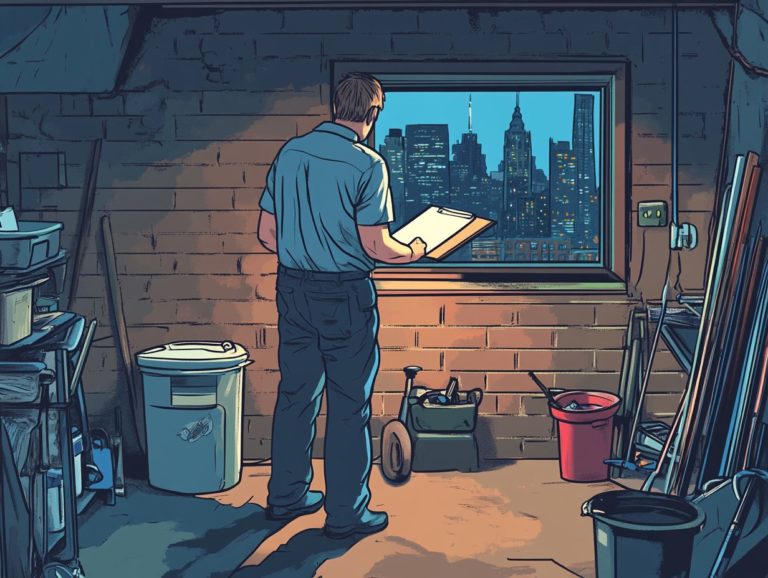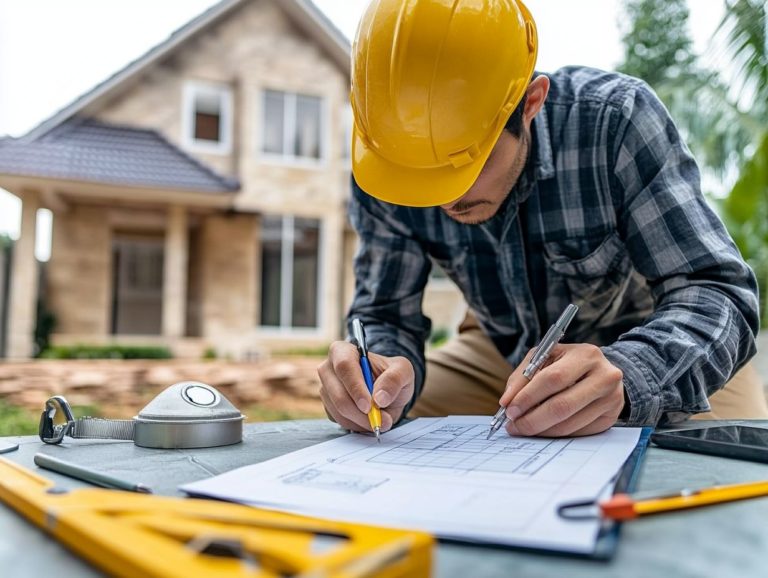Understanding Home Inspection Reports
When buying or selling a home, a home inspection report is essential for navigating real estate transactions. This document provides an overview of a property’s condition, highlighting concerns and necessary maintenance.
This guide explores the elements of a home inspection report. You’ll learn how to interpret the information effectively, empowering you to make informed decisions and spot potential red flags confidently.
Contents
- Key Takeaways:
- What is a Home Inspection Report?
- What to Expect in a Home Inspection Report
- Interpreting the Information in a Home Inspection Report
- How to Use a Home Inspection Report
- Tips for Reviewing a Home Inspection Report
- Potential Red Flags in a Home Inspection Report
- Frequently Asked Questions
- What is a home inspection report?
- Why is it important to understand a home inspection report?
- What should I look for in a home inspection report?
- Who should read and interpret a home inspection report?
- What if I don’t understand something in the home inspection report?
- Can I negotiate repairs based on the findings in the home inspection report?
Key Takeaways:

A home inspection report offers detailed information about a property’s condition. It’s vital for buyers, sellers, and homeowners to understand this report for informed decision-making.
Pay attention to common sections like the roof, foundation, and electrical system. Understanding the terminology used is also crucial for interpreting the report accurately.
This report can help negotiate repairs or adjust the sale price. Review it carefully and consult professionals if needed for a full understanding.
What is a Home Inspection Report?
A Home Inspection Report is a detailed document that outlines the findings of a certified inspector after a careful visual check of a property, making understanding the basics of home inspections crucial for homeowners.
Requested by buyers or sellers during a real estate transaction, this report evaluates the condition of essential components, including structural integrity, electrical systems, and plumbing.
It serves as a vital resource, helping you understand potential repair costs and identify significant issues that need attention before finalizing the sale.
Explanation and Purpose of the Report
The main purpose of an inspection report is to present findings clearly, focusing on safety concerns that could affect livability.
This document acts as a roadmap for you, the home buyer or seller, detailing every critical aspect of the property’s condition. It typically includes a summary page that highlights significant findings for a quick understanding of essential systems and repairs needed.
Understanding these findings is crucial for buyers as they influence investment decisions and future livability. Sellers can use this information to address repairs before listing or anticipate buyer questions.
Grasping the inspection report not only aids in making informed choices but also promotes transparency in real estate transactions.
What to Expect in a Home Inspection Report
Expect a comprehensive evaluation of the property’s condition, including an in-depth analysis of electrical and plumbing systems alongside any potential repair costs.
Advanced techniques, like thermal imaging, may reveal hidden issues that could otherwise go unnoticed. Thermal imaging helps identify problems behind walls that aren’t visible to the naked eye.
Common Sections and Components
A typical inspection report includes several key sections, starting with a summary page that outlines major issues and detailed findings on vital components of the home. Understanding home inspection reports is essential, as this summary serves as an important reference point, highlighting significant concerns uncovered during the inspection.
It often contains sections that focus on specific areas of concern, such as structural integrity, electrical systems, plumbing, and roofing. Each component is carefully assessed, ensuring you understand the home s condition.
These findings aid in home appraisals and are crucial for negotiations between buyers and sellers. By providing a comprehensive overview of the property s state, this report gives you the power to make informed offers or request necessary repairs before closing the transaction.
Interpreting the Information in a Home Inspection Report

Interpreting the details in a Home Inspection Report demands a firm grasp of the terminology and ratings employed by certified inspectors, making it crucial to explore understanding the home inspection process.
This understanding equips you with vital negotiation leverage during the property transaction process, helping you navigate the complexities of home buying with confidence.
Understanding Terminology and Ratings
The terminology and ratings in an inspection report can seem complex. However, grasping them is essential for you as a home buyer to pinpoint potential safety concerns and significant issues within the property. For a deeper insight, refer to understanding the home inspection process.
Commonly used terms like “deficient,” “satisfactory,” and “urgent repair required” each convey distinct levels of concern. For example, a “deficient” rating suggests that a system isn’t performing at its best and may soon need attention. This could influence your decision, as it highlights possible future expenses.
If a property is marked with “urgent repair required,” that could raise immediate red flags, potentially dissuading you from moving forward.
By familiarizing yourself with these ratings and terms, you can better assess the investment risk and prioritize repairs. Ultimately, this enhances your negotiation power and shapes your expectations.
How to Use a Home Inspection Report
Leveraging a Home Inspection Report effectively gives you the power to make well-informed decisions about your purchase.
By utilizing the insights provided, you can assess potential repair costs and craft strategic negotiation strategies, all of which may pave the way for a more advantageous deal.
Making Informed Decisions Based on the Report
Making informed decisions based on a Home Inspection Report requires you to carefully evaluate the major issues and associated repair costs to determine whether buying the home is a good idea.
Take the time to categorize the issues highlighted in the report. Distinguish between minor repairs that are easy to fix and major concerns that could jeopardize your investment.
By prioritizing these repairs, you can develop a strategic approach to negotiations with sellers. Emphasize critical findings that demand immediate attention.
Addressing significant issues like structural damage or outdated electrical systems early in negotiations can lead to more favorable terms, such as reduced pricing or seller concessions.
Understanding these implications enables you to weigh potential future costs against your overall budget. This enhances your bargaining power in the home buying process.
Tips for Reviewing a Home Inspection Report
When you review a Home Inspection Report, it’s crucial to pay close attention to the key areas highlighted by the certified inspector. Focus particularly on aspects that may present safety concerns or reveal significant issues requiring immediate attention.
Key Areas to Pay Attention to

During a home inspection, it’s essential for you to focus on key areas like structural integrity, electrical systems, and plumbing systems. These components often reveal red flags that could signal serious safety concerns and lead to costly repairs down the line.
Grasping the condition of these elements is crucial for you as a prospective buyer. Issues such as cracked foundations, outdated wiring, or leaking pipes can indicate underlying problems that may worsen over time.
For example, compromised structural integrity could jeopardize the safety of the occupants and significantly decrease the property’s value. An inadequate electrical system might present fire hazards or result in frequent outages, while faulty plumbing can lead to water damage and mold growth.
By evaluating these areas, you empower yourself to make informed decisions. This may involve negotiating for necessary repairs or adjustments in the purchase price.
Potential Red Flags in a Home Inspection Report
Spotting red flags in a Home Inspection Report is crucial for savvy buyers like you!
These indicators of significant issues can greatly affect repair costs and the overall value of the property.
Don t overlook these details; they can save you from unexpected repair bills in the future!
Identifying Major Issues and Concerns
Wondering what secrets your future home might hold? A home inspection report reveals all. When you review the inspection report, it s crucial to pinpoint major issues and concerns, such as foundation problems, electrical faults, and plumbing leaks.
These elements are essential for assessing future repair costs and ensuring your safety. Such factors are red flags that can significantly influence your decision as a buyer.
For instance, foundation issues can lead to repair costs that soar into the thousands if not addressed swiftly. Electrical faults pose serious safety risks, including fire hazards or unexpected outages factors that potential homeowners cannot afford to overlook.
Then there are plumbing leaks, which not only jeopardize your water systems but can also cause extensive damage to interiors. This can lead to skyrocketing costs for water damage repairs.
Understanding these major issues equips you to negotiate more effectively or, in some cases, even reconsider your purchase entirely.
Frequently Asked Questions
What is a home inspection report?
A home inspection report is a document prepared by a professional home inspector that provides a detailed assessment of a property’s overall condition. It includes observations, findings, and recommendations for potential issues.
Why is it important to understand a home inspection report?

Understanding a home inspection report is crucial as it helps you make informed decisions about the condition of a property you are buying or selling. Knowing what to expect in a home inspection report also allows you to plan for any necessary repairs or future maintenance.
What should I look for in a home inspection report?
In a home inspection report, you should look for a thorough description of the parts of the house, major systems, and any potential safety hazards. Additionally, understanding home inspection standards can help you pay attention to any recommended repairs or further inspections.
Who should read and interpret a home inspection report?
Typically, home buyers and sellers will read and interpret the home inspection report. However, it s recommended to have a professional, such as a real estate agent or attorney, review the report with you to ensure a clear understanding of the findings.
What if I don’t understand something in the home inspection report?
If there s something you don t understand in the home inspection report, don t hesitate to ask the home inspector for clarification. They are there to answer your questions and provide explanations to help you understand the report better.
Can I negotiate repairs based on the findings in the home inspection report?
Yes, you can negotiate repairs based on the findings in the home inspection report. If major issues are found, you can use the report as a bargaining tool to potentially negotiate a lower price or request the seller to make necessary repairs before finalizing the sale.
Interested in ensuring your future home is safe and sound? Schedule a home inspection today or consult a professional!






